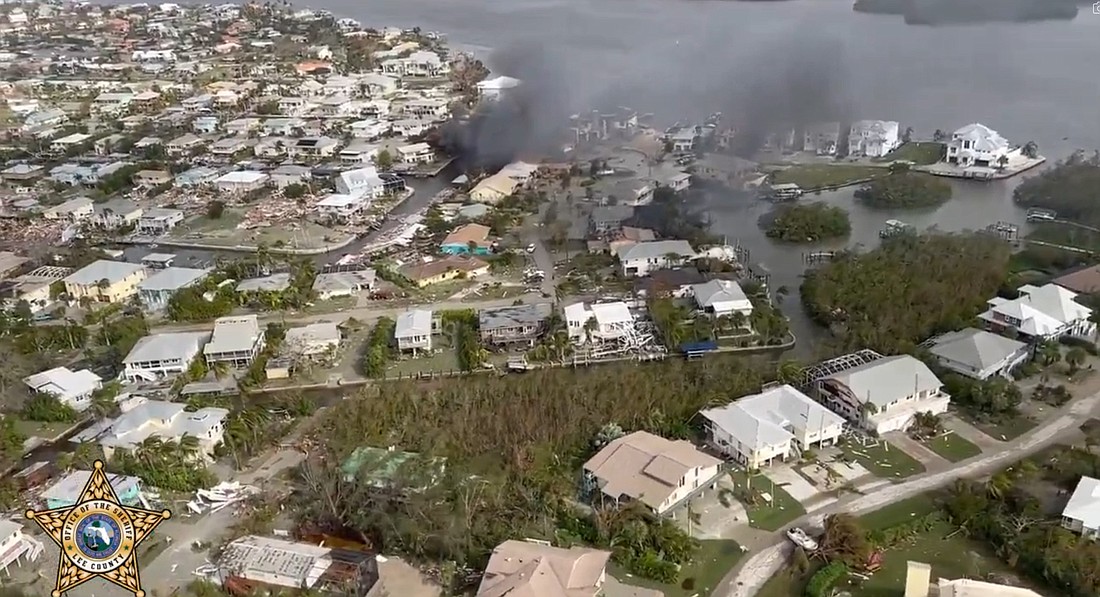
Northeast Florida was spared the devastation wrought by Category 4 Hurricane Ian in other parts of the state, but that doesn’t mean the disaster will not affect almost everyone who carries property and casualty insurance.
An initial analysis released Sept. 29 by Fitch Ratings indicates the total insurance claims related to the hurricane could be as high as $40 billion.
Two Jacksonville insurance agents, Matt Carlucci and Jim Love, said they were pleased to not be in the field Sept. 30 visiting policyholders filing damage claims, but the experience makes them think about what the future may bring for the insurance industry in Florida.
The market has been under strain for years as companies either stopped writing property and casualty insurance in the state or were so unable to pay all the claims filed that they went out of business.
That means fewer companies are writing policies, and that’s the growing problem that may be made even greater by the claims that soon will be filed after Hurricane Ian.
“Many insurers providing property coverage in the state experienced severe downturns in underwriting performance and capitalization levels in recent years despite no hurricane hitting the state since 2018. This trend has forced a number of smaller insurers into liquidation, exacerbating the challenges for policyholders of finding private market homeowners insurance coverage,” Fitch said on its website.
“The key to the market is to have a lot of companies in business to spread the risk,” Carlucci said.
The state Legislature created Citizens Property Insurance Corp. in 2002 to serve as a safety net for property owners who are unable to obtain casualty insurance from private carriers.
“Citizens was established to be the last resort, but now it’s almost the first resort,” Carlucci said.
The state-backed insurer has grown in the past 20 years to more than 1 million policyholders.
“I am seeing a lot of folks whose premiums are doubling. If Citizens is 20% less than their current premium, I can write the policy. I am glad they are there,” Love said.
The legislation that created Citizens also authorizes the insurer to levy an assessment on all property insurance policyholders in the state, regardless of their carrier, if claims filed with Citizens exceed its financial ability to pay the claims.
Carlucci said the magnitude of claims filed after Hurricane Ian might force the Legislature to make it mandatory for all policyholders to contribute to the loss through the Florida Hurricane Catastrophe Fund.
It is a state trust fund that provides reimbursement to residential property insurers for a portion of their Florida catastrophic hurricane losses. It is intended to be self-supporting, with funding primarily from actuarially determined premiums paid by residential property insurance companies, and, in some circumstances, revenue bonds backed by emergency assessments on a variety of property and casualty insurance premiums.
The state may levy an emergency assessment for the tax-exempt trust fund after Hurricane Ian like it did after Hurricanes Matthew in 2016 and Irma in 2017.
“No matter where you live or whether you were affected, your premium contributes toward the welfare of the state. I believe rates will continue to rise and every policy will be assessed,” Carlucci said.
While the expected flood of claims will further stress the insurance industry, Love and Carlucci also predict there will be restoration challenges caused by the current migration to Florida by people from other states.
“Contractors in Florida are focused on new construction, not repairs,” Carlucci said.
“Repairs will take a year or more because contractors are swamped,” Love said.